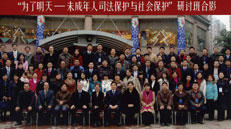
From January 14-16, 2008, IBJ held its first region-wide training seminar in Southwest China. Held in Chongqing in cooperation with the China Society of Juvenile Delinquency Research, an influential government agency responsible for researching and improving upon the state of the juvenile justice system and the Chongqing Lawyers’ Association, this seminar provided an opportunity for IBJ and its partners to train and inspire legal professionals from resource-deprived areas of southwest China to advocate strongly and effectively for the rights of accused juveniles.
 Furthermore, it provided a forum for key stakeholders in the juvenile justice system to meet, so that they could discuss and resolve issues impacting upon children’s rights. A central theme of the training was the need to overcome indifference to the plight of accused juveniles. IBJ’s China Program Director, Jennifer Smith opened the seminar with a call for more action in the defense and protection of children. She urged participants not to be “indifferent to the suffering of the thousands of children who every year are detained by the criminal justice system. Though we may feel, at times, that the problems are too great for one man, we have a responsibility as protectors and advocates, to strive to help every child that we can. And we must remember that together, we have the power to achieve great change in this world.”
Furthermore, it provided a forum for key stakeholders in the juvenile justice system to meet, so that they could discuss and resolve issues impacting upon children’s rights. A central theme of the training was the need to overcome indifference to the plight of accused juveniles. IBJ’s China Program Director, Jennifer Smith opened the seminar with a call for more action in the defense and protection of children. She urged participants not to be “indifferent to the suffering of the thousands of children who every year are detained by the criminal justice system. Though we may feel, at times, that the problems are too great for one man, we have a responsibility as protectors and advocates, to strive to help every child that we can. And we must remember that together, we have the power to achieve great change in this world.”
The seminar’s specific focus on juvenile defense advocacy took into account that the majority of criminal cases that Chinese lawyers handle are juvenile cases. By law, juveniles (unlike most adult defendants) are entitled to appointment of counsel. Despite this fact, in practice, many juveniles go through the criminal process without ever seeing a lawyer. Those who do receive appointment of counsel frequently receive substandard legal representation. Without access to effective assistance of counsel juveniles are more likely to be held in pre-trial detention, for months or longer. They are also more vulnerable to abuse and their sentences are more severe.
In attendance were 62 legal aid and private lawyers and select judges, prosecutors, detention officials and government officials from around southwest China. By bringing together such diverse actors, IBJ was able; not only to educate communities about best practice principles for the diversion of juvenile offenders, but to develop partnerships that will lead to more meaningful implementation of laws that are designed to protect the rights of accused juveniles. As stated by a Chongqing juvenile court judge in attendance, “IBJ has built a platform for dialogue among the justice community. Attending IBJ’s training, communicating with lawyers, I understand that only when different groups in the justice community come together will we be capable of improving the justice system. I look forward to working with IBJ to develop models for reform.”